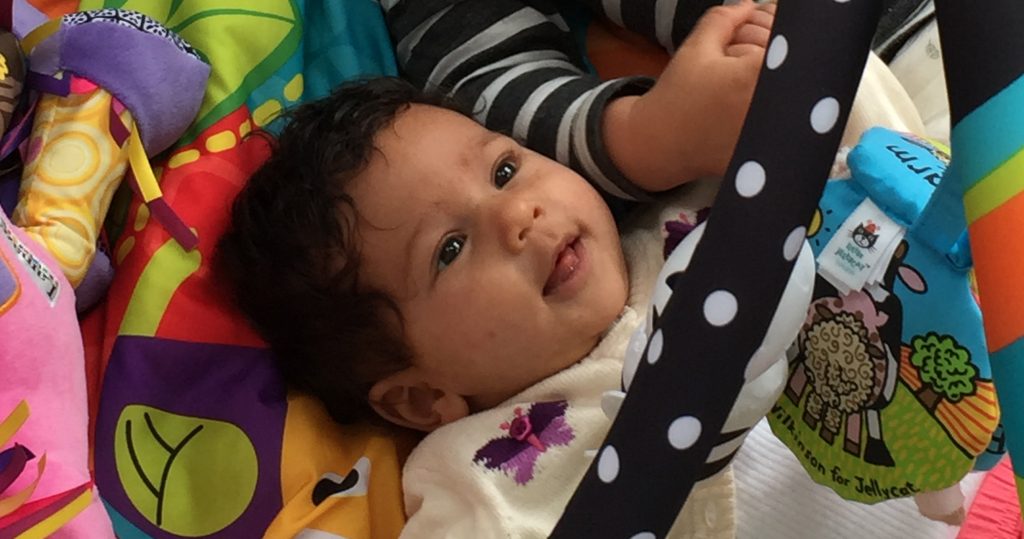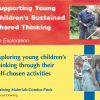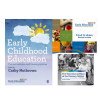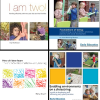Letter to the next Prime Minister
The letter below sets out our key asks for the next government.
Taking care of a baby is tiring work, with a lot of feeding, nappies and broken nights. When you are exhausted, it can be harder to notice that a baby is really alert to what you do and say. It can be even harder if you have been told, “Babies don’t do anything” or “They’re not very interesting at first”.
But if you watch and listen to babies, you soon realise that people who say these things are missing so much.
Babies are learning from their first days. In fact, their brains are working before they are born, especially on seeing and hearing. You would not think there was much to see or listen to while babies are still developing in the womb. But by the end of pregnancy, light definitely filters through to babies – and the womb is a noisy place.
Human babies are vulnerable. After they are born, they need good care just to survive. They cannot stagger to their feet like a newborn calf. But what they are missing in get-up-and-go, they make up for in brain power.
For instance:
Babies learn through repetition and by trying out lots of different ways to do the same thing. They actually build up connections in the brain with their keen practice in making trills of sound, playing with their toes or learning to crawl.
The world is all new to babies. So, in the first year of life, they find out that a toy dropped over the side of their high chair will make the same sound each time, but a cloth bib flutters down and does not make much sound when it touches the ground.
They like to have the same song from you or a peek-a-boo game with their older sibling. This enthusiasm for “again!” is spot on for their learning. Repeating the same thing helps them remember because it makes the unknown more familiar. A baby’s broad smile shows you she knows that a particular hand gesture you make means you are going to do “Round and round the garden”. And happy repetition can help older children in the family too. A 4-year-old big brother will be thrilled when “my baby” starts the peek-a-boo game by waving the cloth in the air.
Babies learn to use hands and mouth to explore. They put interesting things in their mouth because the nerve endings there are the most sensitive in their body. It makes no sense to try to stop them. Just make double sure that anything they can reach is safe to suck. Babies use their current favourite action on anything. Holding, staring and mouthing are soon followed by tapping, shaking, poking or rubbing. Some actions, like dropping or throwing, can grow into a funny game with you or an older child as the fetcher.
You do a great deal of care for babies so it is useful that they are keen to learn while you are feeding or changing them. Of course, you need to keep them safe on the changing mat or in your arms for breast or bottle feeding. But at the same time they are busy watching you while you feed them. They feel cherished by you and you are their safe place. Older babies want to use their physical skills to hold a cup or wave a spoon. Soon they will share in their dressing – although a hat is as likely to be taken off as put on.
They listen to your words or singing as you change nappy and wet clothes. Babies as young as 3 months old can already join in through simple turn-taking. You say something and pause. They come back with sounds and gestures, then they pause. Amazingly, babies have already worked out the basics of a conversation. You help when you:
There is a wide selection of baby toys in the shops. Some play resources are as good as ever: rattles, simple stackers, tough picture books, good quality bricks, dolls and teddies and pull-along toys. But the best toy ever invented for babies is still you. A playful, attentive adult comes equipped with a voice, eyes, ears, hands, a lap and a memory of what the baby liked yesterday.
Some plastic baby toys and kits are advertised as essential for early learning or for brain development. Take these advertisements with a large pinch of salt, because many are untrue. The early months and years are very important. But babies build their own brains through their happy early conversations with you and by playing with simple materials. We live in a high-tech society now, but babies remain saucepan and cardboard box people.
Babies’ toys and the surrounding area need to be kept clean enough. But baby toys do not all have to be plastic. They certainly do not all have to be in bright colours or make funny noises. Babies like pastels sometimes and the look and feel of wood or soft materials. They do not want everything to make a noise.
Once babies can sit up without support, they have their hands free and a whole new world of play opens up. They learn from simple toys that they can move about, shake, put into and take out of larger containers. And you do not have to buy everything. Make up a treasure basket with a range of items that are not conventional toys. You could have a wooden spoon, a metal tea strainer, a large cotton reel, a soft cloth ball, a bath sponge or the old-fashioned dolly wooden clothes peg. Check that anything is safe to go in a baby’s mouth and has no rough edges. Sit close by and watch – but you do not have to say anything unless the baby is clearly inviting your comment.
Babies have a strong sense of musical pattern and rhythm.
Babies love books, pictures and simple story-telling through a book or a nursery rhyme. The best way to introduce babies to really, really early literacy is through enjoying a book on your lap. Look together, read the story or make up a simple storyline to a good picture book. Board or cloth books will survive the inevitable chewing. You can buy some books and use the local library. Avoid wasting your money on plastic toys that claim to support early literacy because the alphabet is fixed to the surface. Babies are nowhere near understanding the ideas of an alphabet and will not be for years!
Young babies want to use all their physical skills. Watch how they concentrate on looking, reaching out and then grasping something of interest. Of course, they have no idea of danger at all, so you need to make sure that whatever they can grab is safe. Babies put serious effort into learning how to move on their own and many do this through crawling. Watch their determination as they move from rocking to and fro towards perfecting a workable crawl. The top of their body is stronger than the lower half. So quite a few babies go backwards the first time but they do not give up. Not all babies move themselves by crawling. Some do an efficient bottom-shuffle and some do half-crawl, half-shuffle.
Babies need plenty of opportunities to practise their chosen gymnastics. They cannot learn if they spend too much time in a baby seat or buggy. They need a safe space for moving around. Often the best area is on a comfortable floor, with you as a playful companion who is happy to be used as a climbing frame. Babies are keen to use any skill that they have discovered. Once they have got the idea of crawling or cruising along the furniture, they are keen to use this skill to get to things of interest. But sometimes you will see older babies crawling for the sheer joy of moving from place to place. This enthusiastic “let’s do it” is all part of early learning.
Jennie Lindon is a chartered psychologist, with over 30 years’ experience of working with early years services for children and their families. She has written many books and magazine articles for parents and early years practitioners.

The letter below sets out our key asks for the next government.
by Mona Sakr Nurseries are at the heart of enabling children to positively contribute to the communities they live in. Through their work with children
Clare Devlin, Early Education Associate What aspects of physical development should we focus on within the Early Years Foundation Stage (EYFS) and other early years
by Anni McTavish What are treasure baskets? “Treasure Baskets” are a collection of ordinary household objects, that are chosen to offer variety and fascination for
by Debi Keyte- Hartland The term “Loose Parts” was coined by Simon Nicholson, a British architect and designer whose parents were artists Barbara Hepworth and
by Helen J Williams Early mathematics is essential for children’s full development, it is also predictive of later, wider achievement. Early mathematical learning is critical
by Kathryn Solly The benefits of outdoor learning in the early years have now been firmly recognised for both educators and young children’s learning and
What is continuous provision in EYFS? By Ben White Continuous provision in EYFS refers to the resources and learning opportunities accessible to children all of
The Families’ Access to Nature Project was undertaken by the Froebel Trust and Early Education between October 2021 and January 2022. Children, their parents, and
by Leslie Patterson At the very beginning of the 1970s I was lucky enough to attend a playschool, at a time when there was very
Guest blog by Sara Knight Why are opportunities for risk and adventure essential for normal development in the early years? Tim Gill (2007) identifies four
Guest blog from Dr Elizabeth Byrne, University of Cambridge Most educators will be aware that “what works” in support of children’s learning and development is
ICT – what’s it all about? ICT is information and communications technology. The term simply means all the technology around us, things like mobile phones,
Toddlers are very busy people. They are keen to learn about the world around them and ready to be fascinated by things that seem ordinary
Children’s curiosity about the world around them is apparent from the day they are born. Babies quickly use all their senses to explore themselves and
Reading is fun. It’s also a key skill that helps us to learn and to live our lives – so starting to read is an
What? Why? When? Where? What for? – and Why? yet again. Sometimes children’s questions just keep on coming. It can be wearing, especially if you
It’s true, maths really is everywhere, and learning about it doesn’t happen just at school or nursery. Young children have lots of important mathematical experiences
What is mark making? Mark making is the term used to describe the marks that children in their early years make on paper and is
The role of music in the early years Everyone knows how much young children love to sing and dance, but all too often music is
Children learn how to behave All children are individuals, because they are born with their own character. This is why even children within the same
Early childhood seems like a time of constant change to adults. Just as you’ve got used to a predictable daytime nap, your child decides that
Why go outside? Big movers Have you ever been in an open space with young children? The first thing they want to do is to
Young children are artists. They use all sorts of materials to show what they have noticed about the world. They might draw the rain falling
Here are some links to resources to support your play. Loose parts play tookit is such a rich and comprehensive free publication from Inspiring Scotland to
Here are twelve links with free ideas to support play and learning at home, suitable for early years, nursery, reception and school aged children in
When writing our January Early Years Teaching News, I tweeted a survey to ask if practitioners and leaders would like information about ICT or outside
It is important to include families in helping to shape your decisions in relation to developments you want to make. Families know their circumstances best
This content by Jan White comes from our out of print leaflet “The Sky is the Limit: Babies and Toddlers Outdoors: developing thinking, provision and practice”
Since the introduction of the EYFS framework in 2008 there has been a huge emphasis upon encouraging parents to become engaged in their children’s learning.
The Duchess of Cambridge launched The Royal Foundation Centre for Early Childhood on 18th June 2021 with a substantial report Big change starts small which identifies six
Entering the unknown It was extremely hard and emotional to say goodbye to the children and parents in my Reception class at the end of
Healthy settling for high wellbeing How can we best help children feel at ease so that they are secure and settled in their new provision?






Early Education
2 Victoria Square
St Albans
AL1 3TF
T: 01727 884925
E: office@early-education.org.uk